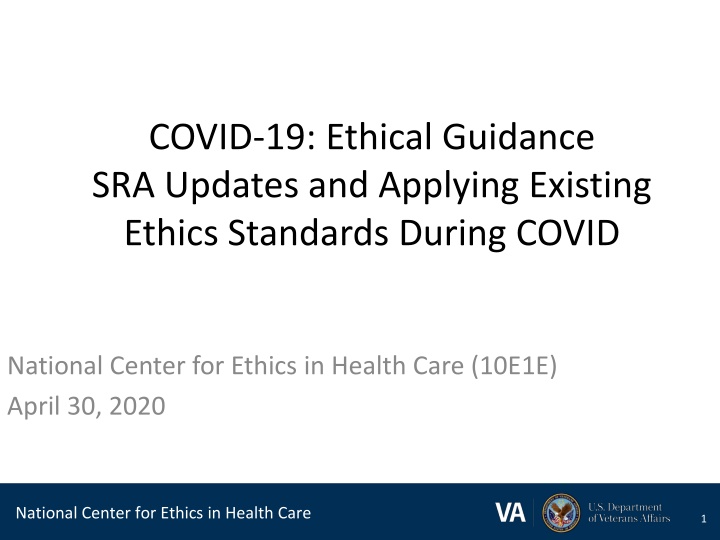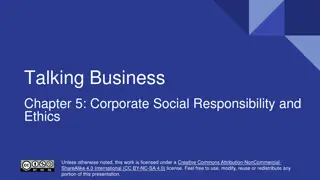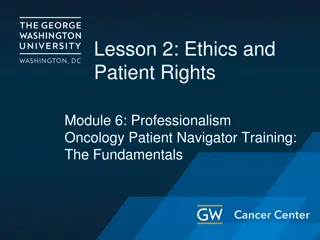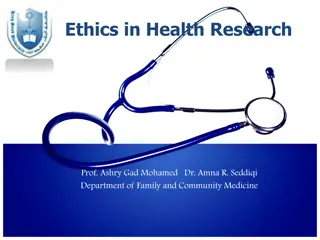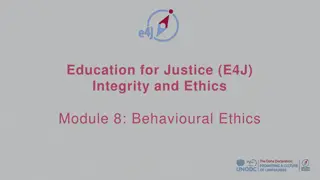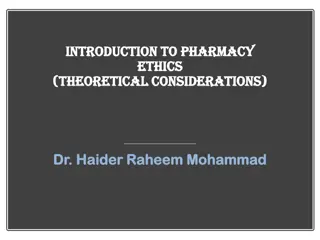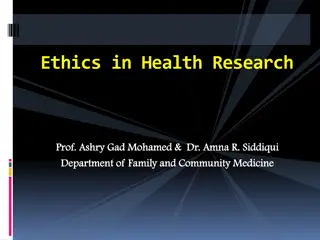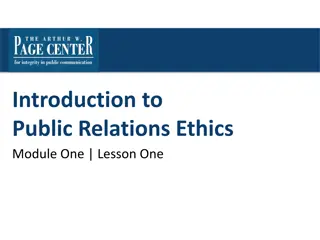Ethical Guidelines and Updates for COVID-19 Health Care Ethics Standards
During the COVID-19 pandemic, the National Center for Ethics in Health Care is providing ethical guidance and updates for healthcare professionals. This includes information on SOFA scoring, triage flow diagrams, and building resilience in the face of challenges. Updates to the SOFA scoring system reflect experiences with COVID-19 patients, such as adding respiratory indicators and instructions for calculations. The provided resources aim to support healthcare providers in making ethical decisions and maintaining ethical standards during the crisis.
Download Presentation

Please find below an Image/Link to download the presentation.
The content on the website is provided AS IS for your information and personal use only. It may not be sold, licensed, or shared on other websites without obtaining consent from the author.If you encounter any issues during the download, it is possible that the publisher has removed the file from their server.
You are allowed to download the files provided on this website for personal or commercial use, subject to the condition that they are used lawfully. All files are the property of their respective owners.
The content on the website is provided AS IS for your information and personal use only. It may not be sold, licensed, or shared on other websites without obtaining consent from the author.
E N D
Presentation Transcript
COVID-19: Ethical Guidance SRA Updates and Applying Existing Ethics Standards During COVID National Center for Ethics in Health Care (10E1E) April 30, 2020 National Center for Ethics in Health Care National Center for Ethics in Health Care 1 1
Agenda Updated SOFA scoring Triage flow diagram UNDER CONSTRUCTION Applying existing ethics standards during COVID National Center for Ethics in Health Care 2
Building Resilience in the Pandemic and Beyond Feeling overwhelmed: talk to someone Keep the balance: alternate work and play, rest and activity Build resilience: attitude of gratitude, finding the positive Everyone is struggling: kindness goes a long way National Center for Ethics in Health Care 3
Updated SOFA Scoring Based on field and VACO expert review changes reflect COVID experience: Added respiratory indicator (SpO2/FiO2) when no ABG Added Dobutamine Added instructions about how to add Vasopressin to SOFA calculation Clarified scoring approach for Glasgow Coma Score National Center for Ethics in Health Care 4
Updated SOFA Scoring Table Table 10 Sequential Organ Failure Assessment (SOFA) Score*(REVISED 04/29/2020) SOFA Score 2 Organ System Respiratory PaO2/FiO2 mmHg (if ABG) SpO2/FiO2 (only if no ABG)** Coagulation Platelets, x 103/ L or x 106/L Liver Total Bilirubin, mg/dL ( mol/L) Cardiovascular Hypotension (doses in mcg/kg/min) Vasopressin*** CNS Glasgow Coma Score**** Renal Creatinine, mg/dL ( mol/L) 0 1 3 4 > 400 301 - 400 201 - 300 101 - 200 100 > 400 316 - 400 236 - 315 151 - 235 150 > 150 101 - 150 51 - 100 21 - 50 20 <1.2 (<20) 1.2 - 1.9 (20 - 32) 2.0 - 5.9 (33 - 100) 6.0 - 11.9 (101 - 203) > 12 (>203) None MABP < 70 mmHg Dop 5 or Dobutamine any dose Dop 6 - 15 or Epi 0.1 or Norepi 0.1 Dop > 15 or Epi > 0.1 or Norep > 0.1 15 13 - 14 10 - 12 6 - 9 < 6 < 1.2 (<106) 1.2 - 1.9 (106 - 168) 2.0 - 3.4 (169 - 300) 3.5 - 4.9 (301 - 433) > 5 (> 434) or anuric National Center for Ethics in Health Care 5
*Adapted from: Ferreira et al., 2001. Explanation of variables: PaO2/FiO2 indicates the level of oxygen in the patient s blood (see ** below only if no ABG available). Platelets are a critical component of blood clotting. Bilirubin is measured by a blood test and indicates liver function. Hypotension indicates low blood pressure; scores of 2, 3, and 4 indicate that blood pressure must be maintained by the use of powerful medications that require ICU monitoring, including dopamine, epinephrine, dobutamine, and norepinephrine (see *** below for vasopressin). The Glasgow Coma Score is a standardized measure that indicates neurologic function; low score indicates poorer function (see **** below for scoring details). Creatinine is measured by a blood test and indicates kidney function. **Adapted from: Grissom et al., 2010. NOTE: Use SpO2/FiO2 only if no ABG available, if ABG available use PaO2/FiO2. ***Vasopressin: If used in conjunction with other pressor do not include in the SOFA score. If used alone score as follows: 0.01 u/min = 0 points; 0.02 u/min = 0 points; 0.03 u/min = +2 points; 0.04 u/min = +3 points; 0.05 u/min = +4 points. ****Glasgow Coma Score (GCS): If baseline mental status is unknown assume normal value for all assessment scoring. If patient is sedated or paralyzed use the last known value before sedation or paralysis for all subsequent assessment scoring. National Center for Ethics in Health Care 6
Triage Flow Diagram Under Construction National Center for Ethics in Health Care 7
Applying Existing Ethics Standards During COVID Informed Consent Bundled Consent Surrogate Designation Advance Directives Witness Signatures LSTDI GoCC MDC Privacy Visitation National Center for Ethics in Health Care 8
In general, use all existing policies to meet needs Notice the new application, not new ethics Standard Normal Contingency Crisis IC -Signature -Asynchronous X X X X X X AD -Witnesses X X X LSTDI -GoCC -MDC Do Do Do more Do more Do most Do most efficiently iMedConsent -Blanket -Bundling -Opioids No-no Yes X No-no Yes X No-no Yes X Privacy -Visitation X X X National Center for Ethics in Health Care 9
Bundling Consent To improve efficiency in the intensive care unit during a COVID- 19 surge, can we bundle the informed consent for several procedures such as central lines, bronchoscopies, dialysis, chest tubes and other interventions? Yes because Bundling is not considered blanket consent. Blanket consent is not permitted because it is neither treatment-or procedure-specific nor is it consistent with VA informed consent policy that requires the patient s separate consent for each treatment or procedure Bundled consent enables practitioners performing multiple procedures that require signature consent (e.g., central line placement and bronchoscopy) to obtain informed consent for this care efficiently and consistent with strong ethics practices. To help, we have made Instructions for Clinical Application Coordinators (CACs) to develop bundled consents. VHA Handbook 1004.01, Informed Consent for Clinical Treatments and Procedures, Bundled Consent Standard 4 c. National Center for Ethics in Health Care 10
Designating a Surrogate If a patient with COVID-19 lacks decision-making ability, can a surrogate be designated? Yes. VHA Handbook 1004.01 on Informed Consent for Clinical Treatment and Procedures remains the authoritative source for obtaining informed consent from a surrogate decision-maker when a patient does not have decision-making capacity. If it is determined that the patient lacks decision-making capacity and has an authorized surrogate identified by the priority established in the above policy, that surrogate generally assumes the same authority and responsibilities as the patient in the informed consent process. REF: VHA Handbook 1004.01 Surrogate Decision-Making Standard 14 5(b) Patients Who Have a Surrogate National Center for Ethics in Health Care 11
Signatures on Advance Directives (AD) Is there national guidance on obtaining patient and witness signatures on advance directive forms while maintaining social distancing? Yes, the regulatory requirements that a patient sign a VA advance directive in the presence of two adult witnesses cannot be waived or altered under the current COVID-19 pandemic. Patient and witness cannot orally sign Clinicians cannot sign on behalf of patients. But there are work-arounds REF: VHA Handbook 1004.02 Advance Care Planning Standard Witnesses for Advance Directives 11b1(b) National Center for Ethics in Health Care 12
Work Arounds Signatures on AD If a patient is in isolation and to minimize the risk of exposure: Skype or other electronic or audio-visual equipment can be used so the patient and witnesses can see each other. Enables witnesses to see patient sign and patient to know AD was witnessed. The method the witnesses utilized to perform their role should be documented (e.g., in an Advance Directive Discussion note), along with a brief explanation as to why this approach was needed. National Center for Ethics in Health Care 13
COVID: GoCC Can we conduct a GoCC with patients (or surrogates) virtually (e.g., via telephone, telehealth)? Yes, GoCCs may be conducted via telehealth or telephone. Per VHA Handbook 1004.03, If it is impractical for participants to attend in person, the GoCC may be conducted over the telephone or through video conference, and using telehealth is a proportionate step to take to reduce the risk of harm to patients and employees from COVID-19. Ref: VHA Handbook 1004.03 Life-Sustaining Treatment Decisions Participants in Goals of Care Conversations 5d(3) National Center for Ethics in Health Care 14
COVID: Multidisciplinary Committee (MDC) If the recommended LST plan for a patient who lacks decision making capacity and has no surrogate includes limits to LST, under crisis standards of care (CSC), must the Chief of Staff still review the plan? No. When the plan to limit LST is made through the triage process under CSC, the treatment team would not be required to present the treatment plan to the MDC for review. So, under this specific circumstance, the MDC would not submit the plan for Chief of Staff review. REF: Handbook 1004.03, paragraph 8 National Center for Ethics in Health Care 15
MDC in Crisis Standards of Care (Contd) CSC are implemented as a last resort when dire scarcity of LST require protocols for transparent, fair, and consistent scarce resource allocation. Under CSC, the SRA and triage team process described in Meeting the Challenges of Pandemic, will determine limitations on scarce LST by established protocol. The Multidisciplinary Committee (MDC) does not have a responsibility in circumstances where the triage team has determined that the patient is in the blue triage category and thus does not meet criteria for LST. National Center for Ethics in Health Care 16
COVID: Visitation Policies Never, Sometimes, Always Initial Covid-19 response = Never, with some ad- hoc exceptions (end-of-life) Ethical justifications: control spread of infection, provide compassionate care Ongoing Covid-19 response = Sometimes, with required precautions Ethical justifications: control spread of infection, and provide appropriate support for vulnerable patients National Center for Ethics in Health Care 17
COVID: Visitation Policies Revised visitation policies in U.S. health care for ongoing Covid-19 response Limited visitation to support pediatric care, labor and delivery, discharge, care for those with physical or cognitive disabilities, outpatient cancer clinics, and compassionate care for the dying screen visitors for COVID-related symptoms prior to entry provide visitors with personal protective equipment (PPE) limit the number of visitors with a patient, visitation areas and duration. National Center for Ethics in Health Care 18
COVID: Visitation Policies Update local facility/unit/clinic visitation policies to ensure transparency, consistent application, and fairness in appropriate support for vulnerable patients Such policies should Minimize the need for ad-hoc exceptions Be clearly communicated to all staff, patients, and potential visitors National Center for Ethics in Health Care 19
Questions? Meeting the Challenge of Pandemic Influenza: Ethical Guidance for Leaders and Health Care Professionals in VHA Answers to FAQs can be found at: FAQ: Ethical Challenges Preparing for and Managing COVID-19 vaww.ethics.va.gov Email: vhaethics@va.gov National Center for Ethics in Health Care 20 20
Building Resilience in the Pandemic and Beyond Feeling overwhelmed: talk to someone Keep the balance: alternate work and play, rest and activity Build resilience: attitude of gratitude, finding the positive Everyone is struggling: kindness goes a long way National Center for Ethics in Health Care 21
POLLS National Center for Ethics in Health Care 22
